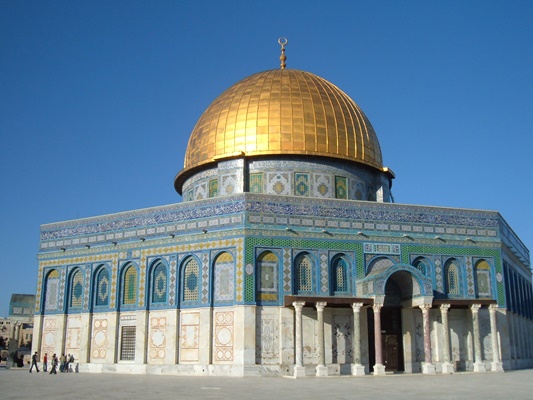From the Jordanian parliament came a call for people to take to the streets and protest at the US embassy in Amman, as Jordan and the Palestinians on Wednesday called for an emergency meeting of Arab foreign ministers to discuss Trump’s decision. The meeting is likely to take place on Saturday, a diplomatic source said.
Meanwhile, the UAE, Saudi Arabia, Egypt, Jordan and Turkey all warned the US president against such a move.
At a joint press conference in Ankara on Wednesday, both the Turkish president, Recep Tayyip Erdogan, and King Abdullah of Jordan spoke out against the US decision.
“Such a step would only play into the hands of terror groups,” Erdogan said ahead of the announcement, adding that “no one has the right to play with the destiny of billions of people for personal ambitions”.
King Abdullah, meanwhile, said, “Jerusalem is key to stability of the entire Middle East”, adding that Turkey and Jordan would stand “shoulder to shoulder to face challenges”.
During a recent visit to Washington, King Abdullah attempted to dissuade the Trump administration from adopting the controversial decision, saying such a move would derail peace efforts and stoke anger from both Muslims and Christians across the region.
Jordan — a key US ally and partner in the anti-ISIS coalition in Iraq and Syria — has a sizeable Palestinian population and is concerned that the US decision will ignite unrest in the Palestinian territories that could spill over into the country and boost extremism in the region.
“Trump’s decision would lead to a Palestinian uprising, which could spark domestic unrest in Jordan that has influential Palestinian circles,” Zaid Nawaiseh, a political analyst based in Amman, said ahead of Trump’s announcement on Wednesday. “Jordan is in the eye of the storm. It is already struggling with economic woes, and it is aware the peace process has reached a dead-end.”
Jordan, too, has a stake in Jerusalem al-Quds, since it serves as the custodian of Al Aqsa mosque, Islam’s third holiest site — a role stipulated in an unpopular peace treaty Jordan signed with Israel in 1994.
“The issue of Jerusalem is sensitive and controversial for the Palestinians, Arabs and the Muslims,” said Osama Al Sharif, a political columnist. “The timing is completely difficult to understand, provocative and goes right into the heart of the credibility of the US as an honest broker or mediator.”
In Israel’s northern neighbour, Lebanon, president Trump’s decision provoked demonstrations by Palestinian communities across the country.
“The decision to move the US embassy to Jerusalem clearly demonstrates the level of Arab dignity and the dignity of Muslims in the head of a superpower that no longer possesses greatness, only insolence and immorality,” said Abed Salameh, who lives in Nahr Al Bared, a Palestinian settlement in northern Lebanon.
There are more than 400,000 Palestinian refugees registered with the United Nations in Lebanon, many living in the country’s 12 official “camps”, which are in reality cities made up largely of concrete apartment blocks.
Lebanese leaders also condemned the decision on Wednesday, and more demonstrations were expected on Friday in the country.
The Hamas representative in Lebanon, Ali Baraka, met Lebanese Prime Minister Saad Hariri on Wednesday “to discuss Palestinian-Lebanese relations”.
Baraka issued a statement saying he had delivered a message to Hariri from Hamas leader Ismail Haniyeh and received assurances of Hariri’s support in rejecting the American announcement.
“We perceived Prime Minister Hariri’s keenness on Jerusalem and its Arabism, and he stressed that Lebanon refuses the Judaisation of Jerusalem and the American decision,” the statement read.
“He said that the Lebanese state will take diplomatic and political measures with the Arab and Islamic states and the international community to support the cause and the Arabism of Jerusalem and in refusal of the biased American decision.”
The US “are telling us in a direct way that they are with Israel,” Baraka told The National after the meeting. “This will create an uprising in Gaza and the West Bank. No Palestinians will accept this.”
Lebanese interior minister Nohad Machnouk meanwhile tweeted “Jerusalem is ours and we will bring back the splendour of Jerusalem”. The tweet included a clip from a song about Jerusalem by the Lebanese singer Fayrouz.
On Wednesday afternoon, ahead of the planned US announcement, there was no visible increase in the presence of Lebanese security forces around the American embassy in Beirut. The embassy itself is in a well-fortified compound on a hill outside of the city, where it was relocated after a bombing in 1983 at its location in downtown Beirut that killed 63 people.
In Egypt, Israel’s neighbour to the south, the only visible sign of protest was a lecture cancelled at the American Research Centre “due to unforeseen circumstances”. But the international security consultancy, Control Risks, released an advisory note saying demonstrations were to be anticipated in the coming days against president Trump’s expected announcement on Jerusalem, particularly near US embassies, in pubic squares and outside mosques after Friday prayers, and warned that “any such demonstrations have the potential to devolve into unrest”.
